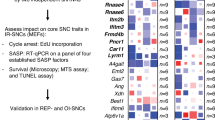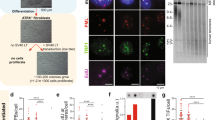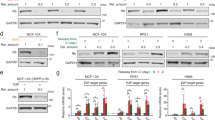Abstract
Normal human diploid cells senesce in vitro and in vivo after a limited number of cell divisions. This process known as cellular senescence is an underlying cause of aging and a critical barrier for development of human cancers. We demonstrate here that reexpression of functional pRB alone in RB/p53-defective tumor cells via a modified tetracycline-regulated gene expression system resulted in a stable growth arrest at the G0/G1 phase of the cell cycle, preventing tumor cells from entering S phase in response to a variety of mitogenic stimuli. These cells displayed multiple morphological changes consistent with cellular senescence and expressed a senescence-associated β-galactosidase biomarker. Further studies indicated that telomerase activity, which was assumably essential for an extended proliferative life-span of neoplastic cells, was abrogated or repressed in the tumor cell lines after induction of pRB (but not p53) expression. Strikingly, when returned to an non-permissive medium for pRB expression, the pRB-induced senescent tumor cells resumed DNA synthesis, attempted to divide but most died in the process, a phenomenon similar to postsenescent crisis of SV40 T-antigen-transformed human diploid fibroblasts in late passage. These observations provide direct evidence that overexpression of pRB alone in RB/p53-defective tumor cells is sufficient to reverse their immortality and cause a phenotype that is, by all generally accepted criteria, indistinguishable from replicative senescence. The results suggest that pRB may play a causal role in the intrinsic cellular senescence program.
This is a preview of subscription content, access via your institution
Access options
Subscribe to this journal
Receive 50 print issues and online access
$259.00 per year
only $5.18 per issue
Buy this article
- Purchase on Springer Link
- Instant access to full article PDF
Prices may be subject to local taxes which are calculated during checkout
Similar content being viewed by others
Author information
Authors and Affiliations
Rights and permissions
About this article
Cite this article
Xu, HJ., Zhou, Y., Ji, W. et al. Reexpression of the retinoblastoma protein in tumor cells induces senescence and telomerase inhibition. Oncogene 15, 2589–2596 (1997). https://doi.org/10.1038/sj.onc.1201446
Received:
Revised:
Accepted:
Issue Date:
DOI: https://doi.org/10.1038/sj.onc.1201446
Keywords
This article is cited by
-
The Duchenne muscular dystrophy gene and cancer
Cellular Oncology (2021)
-
IGFBP-rP1 induces p21 expression through a p53-independent pathway, leading to cellular senescence of MCF-7 breast cancer cells
Journal of Cancer Research and Clinical Oncology (2012)
-
The induction of senescence-like growth arrest by protein kinase C-activating diterpene esters in solid tumor cells
Investigational New Drugs (2010)
-
8-Hydroxydeoxyguanosine induces senescence-like changes in KG-1, human acute myelocytic leukemia cell line
Biotechnology and Bioprocess Engineering (2007)
-
Dehydroepiandrosterone inhibits the progression phase of mammary carcinogenesis by inducing cellular senescence via a p16-dependent but p53-independent mechanism
Breast Cancer Research (2005)



